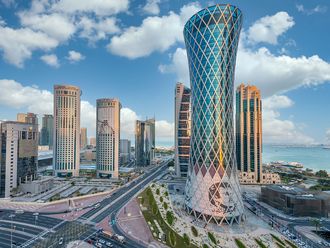Manama: The link between climate change and food sustainability and issues like loss of agricultural lands and depletion of fish were addressed by Doha's Education City students, sitting majlis-style and surrounded by laptops, papers and smart phones.
Organized by Carnegie Mellon University in Qatar with support from Qatar Foundation, Education City's first Campus Conversation event drew more than 100 students interested in how global climate change might affect future generations. In groups of about 10, students from different universities, majors and years sat together to share their knowledge and ideas.
"The concept is simple: We think better when we think together," Robert Cavalier, co-director of the Program for Deliberative Democracy at Carnegie Mellon in Pittsburgh, said.
Carnegie Mellon in Pittsburgh has hosted since 2005 more than 10 conversations on important issues like academic integrity and the cost of health care.
In its first event, the Qatar campus asked students to explore the link between climate change and food sustainability, asking how issues like loss of agricultural lands and depletion of fish might be addressed.
Carnegie Mellon professors in philosophy and biological sciences teamed up with the university's Division of Students Affairs to offer the program, which attracted students from five of the six Education City universities, said Jill Duffy, student development coordinator, according to organizers.
"One of the most meaningful aspects of the Campus Conversation program is how it promotes engagement within one's own community. Ultimately we want to foster a sense of agency in our students, so that they can go out into their respective communities and make a positive difference," Duffy said.
Following a discussion period, each group posed their questions and ideas to an expert panel that highlighted local initiatives and weighed in on the students' proposals.
Making sustainability trendy, buying up foreign land and conserving water - especially in a country that subsidizes utility bills - were among the issues raised by students.
"We thought about establishing an Education City farm to grow produce that we could give to the community," said Layal Al Alami, a Carnegie Mellon student majoring in business administration.
According to Cavalier, Campus Conversations creates a more informed student body, and yields "consulting power" for future changes.
The Division of Student Affairs hopes to utilize the Campus Conversations model in the future to address questions and issues that are important to students, both within Carnegie Mellon Qatar and the broader Education City community.
"The students were excited about the program and have suggestions for future conversations, so I think we'll be seeing more Campus Conversations in the future," Duffy said.












